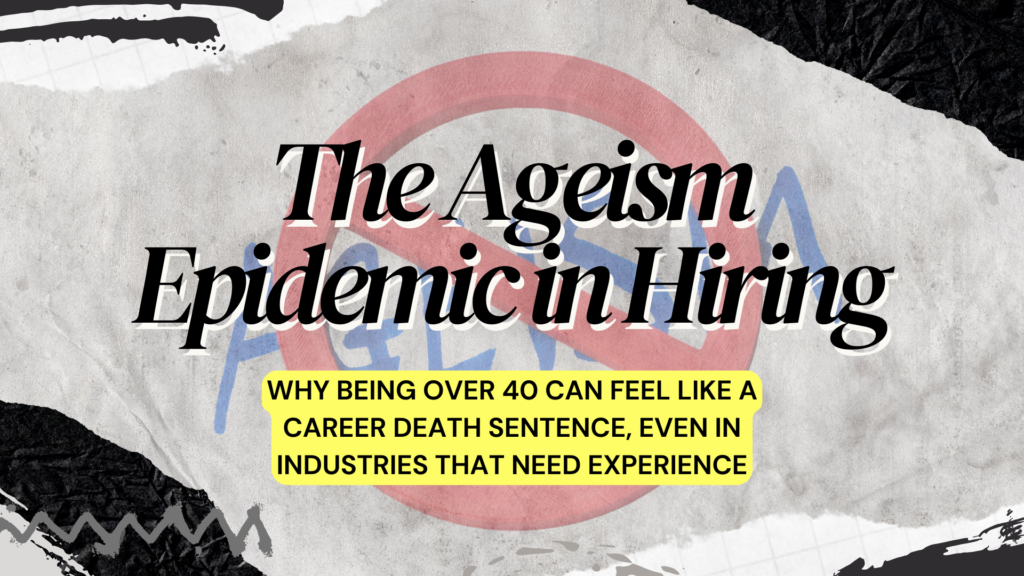
In today’s fast-paced, tech-driven job market, one group of workers finds themselves continually overlooked: those aged 40 and above. Despite decades of experience and a wealth of knowledge, many job seekers over 40 face an uphill battle in securing employment. Ageism—the bias against individuals based on their age—is a significant barrier in the hiring process, and it’s something that doesn’t just affect senior-level executives but also professionals in every industry. But why does being over 40 often feel like a career death sentence?
The Hidden Bias
Ageism in hiring may not always be explicit. Many employers might not openly reject older candidates, but the biases are still prevalent. Studies have shown that resumes featuring candidates over 40 are less likely to receive callbacks, even when they meet the job qualifications. The hidden biases often stem from assumptions about older workers, such as concerns over their ability to adapt to new technologies, their commitment to long-term employment, or even misconceptions about their energy levels.
The ‘Experience’ Dilemma
Ironically, industries that require experience are often the most guilty of ageism. Fields like healthcare, law, education, and even finance often value years of experience. However, when it comes to hiring, employers may prefer younger applicants with perceived “fresh” perspectives, leading to a paradox where the most experienced professionals are often sidelined. This creates a situation where seasoned professionals, who are more than capable of bringing valuable insights and leadership to the table, find themselves competing for positions against younger candidates who may not have the same level of expertise.
The Technology Conundrum
The ever-evolving tech landscape is another contributing factor to ageism. Many industries are heavily reliant on technology, and there’s a common belief that older workers aren’t as tech-savvy as younger generations. While this stereotype may hold some truth for certain individuals, it’s certainly not applicable to everyone over 40. The reality is that many experienced workers have been using new technologies and have kept their skills sharp. However, the stereotype persists, often leaving older candidates to face hurdles in industries where technical proficiency is highly valued.
The Impact on Mental Health
The emotional toll of ageism can be significant. Job seekers over 40 often feel invisible, overlooked, and undervalued, even when they bring considerable experience to the table. The longer the job search continues, the more their confidence can erode. Older workers might start doubting their skills or feel they are not good enough because they aren’t being selected for interviews. In turn, this can lead to feelings of isolation, depression, and burnout.
The Case for Diversity and Inclusion
The narrative that youth is synonymous with innovation and creativity is not only misguided but damaging. Studies have shown that diverse teams—which include a range of ages—are more innovative and perform better. Employers need to recognize the value of having a team that blends the fresh perspectives of younger workers with the expertise and wisdom of older professionals. The combination of both can lead to greater collaboration, more comprehensive problem-solving, and a more dynamic work environment.
Moving Forward: Strategies to Combat Ageism
For individuals over 40, overcoming ageism requires a proactive approach:
- Embrace Lifelong Learning: Staying current with industry trends and learning new skills can demonstrate a commitment to professional growth and adaptability.
- Network Actively: Building connections and getting involved in industry events or organizations can help increase visibility and open doors to new opportunities.
- Highlight Transferable Skills: When applying for jobs, focus on the skills and experiences that are universally valuable, such as leadership, problem-solving, and relationship-building.
- Use Age as an Asset: In interviews, emphasize how your experience brings a unique advantage, whether it’s mentoring younger colleagues, managing projects, or navigating industry challenges.
Employers, too, must actively work to combat ageism. This can be achieved by:
- Promoting Inclusive Hiring Practices: Ensure that hiring policies and job descriptions are inclusive and do not unintentionally discriminate against older applicants.
- Training Managers on Unconscious Bias: Educating managers about ageism and unconscious bias is a crucial step in changing the hiring landscape.
- Fostering an Inclusive Culture: An inclusive workplace culture values the contributions of employees at every stage of their career, fostering an environment of respect and collaboration.
Conclusion
Ageism in hiring is a pervasive issue that prevents talented, experienced workers from thriving in the job market. While industries may claim to value experience, many continue to favor younger candidates, making it feel like a career death sentence for those over 40. However, by recognizing the value of experience, fostering inclusive hiring practices, and embracing the power of diversity, we can break down the barriers that prevent older professionals from finding meaningful work. Ultimately, employers and workers alike must understand that the combination of youth and experience can lead to more robust, innovative, and successful outcomes.
Ready to update your resume and optimize your LinkedIn profile?
Reach out today! www.resumeassassin.com or mary@resumeassassin.com
Connect on LinkedIn: www.linkedin.com/in/mary-southern
Schedule a 15 Minute Call: https://calendly.com/resumeassassin/meet
